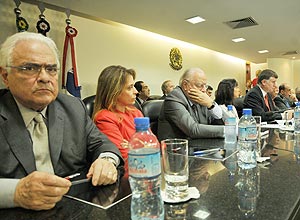Latest Photo Galleries
Brazilian Markets
17h36 Bovespa |
-0,07% | 124.646 |
16h43 Gold |
0,00% | 117 |
17h00 Dollar |
+0,29% | 5,1640 |
16h30 Euro |
+0,49% | 2,65250 |
ADVERTISING
"Purpose of Commission is not to Punish", Says Former Minister of Justice
05/23/2013 - 08h18
Advertising
MATHEUS LEITÃO
JOÃO CARLOS MAGALHÃES
FROM BRASILIA
Investigations of the National Truth Commission should not seek punishment of persons related to deaths, torture and disappearances during the military dictatorship (1964-1985).
This is the opinion of former Justice Minister José Carlos Dias, a member of the board. "The purpose of the commission is not punitive," he said.
The punishment for crimes committed during the period will be a topic discussed by the commission at public hearings starting the middle of next year, about six months before the release of its final report. The purpose of the discussions will help define which recommendations the commission will adopt.
"We cannot do investigations aiming at criminal accountability. Eventually, the facts investigated by the commission may be the object of state action. But it is not up to the commission to make that kind of recommendation," said Dias.
| Karime Xavier/Folhapress |
 |
| José Carlos Dias (left), from Truth Comission |
It is not yet clear what the weight will be of the opinion of people outside of the commission, exposed in the hearings, will have on the definition of the suggestions made by the board - autonomous to prepare its report. The committee's conclusions will not be required to be carried out.
Today, the Amnesty Act prevents the accountability of public officials involved in the killings, torture and disappearances by the dictatorship. The same applies to crimes committed by those who resisted the regime.
CONTROVERSY
A central controversy in the creation of the commission in May of last year, the need to change the law is not a consensus among the seven members of the board.
Two days ago, during an event to disclose the results of a year of the commission's work, Rosa Cardoso, the current coordinator of the board, and Paulo Sérgio Pinheiro, who also held the position, said to be favorable to punishment, as, for example, decided in the 2010 sentence by the Inter-American Court of Human Rights in the case of the Araguaia Guerrilla.
Claudio Fonteles, another of the members, told Folha he would be in favor of changing the law. "If such conduct [violations], by constitutional provision, are indefeasible, obviously they can never be forgotten. And if they cannot be forgotten, there is no sense in talking of amnesty."
Contacted by Folha, the other three members of the group (José Paulo Cavalcanti, Gilson Dipp and Maria Rita Kehl) did not respond by the completion of this edition.
Translated by DAVE WOLIN



